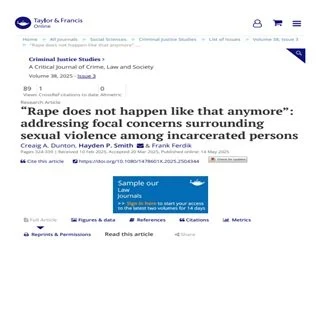By Creaig A. Dunton, Hayden P. Smith, and Frank Ferdik
Unanimously passed by Congress in 2003, the Prison Rape Elimination Act (PREA) was designed to eradicate sexual violence from the American correctional system. Although sexual victimization is a significant issue in correctional facilities, there are other urgent concerns that weigh heavily on the minds of those in custody. To understand these focal concerns, open-ended survey data were collected from (N = 852) incarcerated persons who were serving sentences in four state prisons located in the Southeastern United States during a period of PREA implementation. Respondents cited staff shortages, enforced lockdowns, low-quality food, and inadequate rehabilitative services as focal concerns. Incarcerated persons utilized the PREA prompt as a proxy to share their concerns about safety, climate, and institutional issues. Results are discussed with reference to best practices for improving conditions of confinement to create safe carceral facilities.



